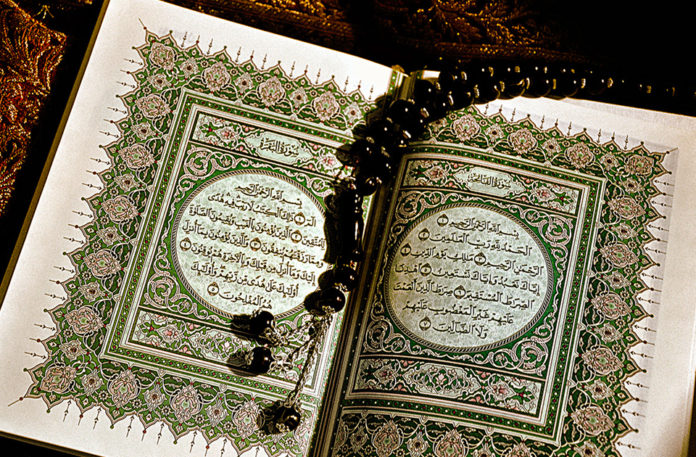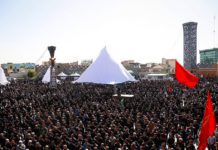All praise is due to Allâh, Lord of all the worlds. May peace and blessings be upon His Messenger, his household and companions.
Fellow Muslims! I implore myself and you all to fear Allâh; this honours the soul and brings it close to its Lord. No God-fearing person will ever fail and anyone who disregards the importance of piety will never be successful.
Dear Muslims! Whoever observes the condition of people in light of the current trials, tribulations and calamities that are occurring all over the world will see that the Muslims are in dire need of a generous guest that brings with it relief and progress. They are in need of this grand guest with whom they hope to be strengthened after a series of indescribable calamities and weakening incidents; hence their need for this great month of tranquility and spiritual development. It is the month of self-examination, conscience reawakening and freedom from selfishness and lustful desires. Allâh says that which translates as:
| O you who have believed! Decreed upon you is fasting as it was decreed upon those before you, that you may become righteous. (Al-Baqarah: 183). |
Fellow Muslims! The month of Ramadân is the month of the Qurân; a Book whose light will never fade and which is a path that never leads one astray. The Glorious Qurân is to man as the soul is to the body; it is a light for guidance. Whoever does not read the Qurân or put its injunctions into practice is dead, despite the fact that they may speak and move. Whoever does not put it into practice has gone far astray even if they are apparently successful in all areas of life.
Allâh says that which translates as:
| Is one who is dead and We gave him life and made for him light by which to walk among the people like one who is in darkness, never to emerge therefrom? (Al-Anâm: 122). |
A human being without the guidance of the Qurân is like any living being without air or water; all their endeavors will end up in bankruptcy. Allâh says that which translates as:
| Say: It is for those who believe, a guidance and a cure And those who do not believe in their ears is deafness, and it (i.e. the Qurân) is upon them blindness. Those are being called from a distant place. (Fussilat: 44). |
Fellow Muslims! There is no doubt that the relationship of many Muslims with the Qurân is one of abandonment of either its recitation or implementation of its injunctions. It is no exaggeration to say that the diseases of past nations have affected the Muslims, while they are unaware of this. Allâh says that which translates as:
| And there are among them unlettered people who do not know not the Scripture except (indulgement in) wishful thinking, but they are only assuming. (Al Baqarah: 78). |
The scholars of Tafsîr say about this verse: It means: they know nothing about the Book except for its recitation, for it never passed their lungs and throats. This is because of the fact that there was a spiritual absence in their recitation and therefore, they were unable to ponder over its meanings.
Among the causes of the absence of reflection on the meanings of the Qurân is the failure to explore and understand the laws of Allâh in relation to human-beings and natural phenomena. Also to blame is the sanctification of erroneous concepts and wrong interpretations of life that have become widespread among people and which are caused by unrestrained love for this world and the hatred of death. Ziyâd Ibn Labîd Al-Ansâri, may Allâh be pleased with him, narrated that the Messenger of Allâh sallallâhu alaihi wa sallam mentioned something and then said:
| .and that is when there will be no more knowledge. We said, O Messenger of Allâh! How will knowledge disappear while we have the Qurân with us and we teach it to our children and while they will also teach it to theirs? The Prophet sallallâhu alaihi wa sallam retorted: I thought you were one of the most knowledgeable of the people of Madînah! Are there not Jews and Christians who have their scriptures with them and yet they take no benefit from what is inside them? (At-Tirmidhî and others). |
One is stricken with grief and shock when they see the stance that many Muslims have adopted with regard to the Book of their Lord. They have been covered by darkness and wander aimlessly; the foreign systems and ideologies that they have embraced have done nothing for them. How can it be that we have the light and yet follow the paths of other nations?
The Messenger of Allâh sallallâhu alaihi wa sallam lived for sixty-three years; we are used to believing that old age and the vicissitudes of life cause hair to turn grey. What then will you think of a man who attributed grey hair to some verses of the glorious Qurân that he used to recite? Abu Bakr, may Allâh be pleased with him, asked the Messenger of Allâh sallallâhu alaihi wa sallam about what caused some of his beard to become grey, he sallallâhu alaihi wa sallam replied: It was caused by Sûrah Hûd, Sûrah Al-Wâqiah, Sûrah An-Naba and Sûrah At-Takwîr. (At-Tirmidhî)
Brothers in faith! The blessed month of Ramadân should be regarded as a wonderful opportunity for every Muslim to save himself from destruction and to purify their soul in preparation for the Qurânic guidance that is inherent in night prayer. Allâh says that which translates as:
| Indeed, the hours of the night (i.e. the rising for Tahajjud prayer) are more effective for concurrence (of heart and tongue) and more suitable for words (i.e. for recitation of the Qurân and for hearing and understanding it). (Al-Muzzammil: 6). |
Brothers in faith! The blessed month of Ramadân is a great opportunity for the Muslims to wake up for night prayers, seek refuge with Allâh and turn to Him for their needs, for none has the power to answer their call except Allâh alone. The Lord descends to the nearest heaven, in a way that befits his majesty, in the last third of the night and asks: Is there anyone who seeks My forgiveness so that I can forgive him? Do any of us ever reflect upon and appreciate this great period which is one of those in which supplications are answered? Tell me, what are the people doing in this last part of the night? Many a miserable soul missed this blessed period! Many people are in deep slumber at this time. It is saddening that some of those who are negligent of this great period are however, ready to go anywhere where they can lodge their complaints and seek solutions to their problems – from their fellow human beings, forgetting that it is only Allâh who is capable of removing sorrow and distress. He says that which translates as:
| What is (the matter) with you that you do not attribute to Allâh (due) grandeur while He has created you in stages? (Nûh: 13-14). |
Imâm Tirmidhî reported that the Prophet of Allâh sallallâhu alaihi wa sallam said:
| There are three persons whose supplications are never rejected: The just leader, the fasting person when he breaks his fast and the oppressed when he supplicates and whose supplication is raised above the clouds and the gates of heaven are opened for it and Allâh will say, By My Glory! I shall assist you even if it is after a while. |
Brothers in faith! There are however, some people who raise their hands in prayer and are impatient for a rapid answer; they may even feel despair if their supplications are not speedily answered. The Messenger of Allâh sallallâhu alaihi wa sallam said:
| Allâh will answer the supplication of any one of you as long as he is not hasty and says: I called my Lord and He did not answer. |
The delay may also be caused by sins such as the failure to uphold the rights of kinship, or perhaps it may be due to the fact that the prayer emanated only from the tongue and was not rooted in the heart. The Prophet sallallâhu alaihi wa sallam said: Allâh does not accept the supplications from an inattentive heart. The heart is not free from turning to the desires of this life and we all know that one who always looks back does not reach his goal in time.
Therefore, I implore you O Muslims, to make plentiful supplications to Allâh, for supplication is the essence of worship. Let nobody slight their requirements however great or small they may be. Allâh says that which translates as:
| And your Lord says: Call upon Me; I will respond to you. Indeed, those who disdain My worship will enter Hell (rendered) contemptible. (Ghâfir: 60). |
Here is an example for those in sorrow and distress: The Messenger of Allâh sallallâhu alaihi wa sallam entered the mosque one day and saw an Ansâri (a resident of Madînah) man there by the name of Abu Umâmah. The Prophet sallallâhu alaihi wa sallam asked him,
| O Abu Umâmah, why are you sitting in the mosque at a time that is not a prayer time? He replied: I was forced to do so by sorrow and debt. The Messenger of Allâh sallallâhu alaihi wa sallam then asked: Shall I teach you a supplication by which Allâh will remove your sorrow and pay for you your debts? He answered: O yes, Messenger of Allâh! The Prophet sallallâhu alaihi wa sallam then said: Say every morning and evening: Allâhumma innî aûdhu bikka minal-hammi wal hazan, wa aûdhu bika minal-ajzi wal-kasal wa aûdhu bika minal-jubni wal-bukhul wa aûdhu bika min ghalabatid-dayn wa qahrir-rijâl. (Meaning: O Allâh, I seek refuge with You from anxiety and sorrow, weakness and laziness, miserliness and cowardice, the burden of debts and from being over powered by men.) Abu Umâmah said: I did that and Allâh removed my distress and paid for me my debt. (Abu Dâwûd). |
Fellow Muslims! The month of Ramadân is a month of generosity and spending in ways that are virtuous. Let every Muslim take part in the generosity of this month and not hesitate to wipe the tears off the faces of orphans, widows and the destitute. Let everyone keep away from stinginess and covetousness for these are two of the bad qualities from which the Messenger of Allâh sallallâhu alaihi wa sallam sought refuge with his Lord from. The Prophet sallallâhu alaihi wa sallam was the most generous of mankind and his generosity multiplied during the month of Ramadân. He would never say no when he was asked of anything.
Further, the benefits of charity are not restricted to the beneficiary; the donor also has a share. An example of this is when a generous person gives in charity, their heart becomes gladdened and they become pleased with that. Therefore, this person will be encouraged to give more and gain extra rewards. As for the miser, whenever he thinks of giving in charity his heart feels constrained; he feels as if he is giving away a chunk of his life!, this in turn leads to his whole life feeling constrained. However, nothing destroys the tricks and insinuations of Satan more than giving sincerely in charity.
Allâh says that which translates as:
| Satan threatens you with poverty and orders you to immorality, while Allâh promises you forgiveness from Him and bounty. And Allâh is All-Encompassing and Knowing. (Al-Baqarah: 268). |






















